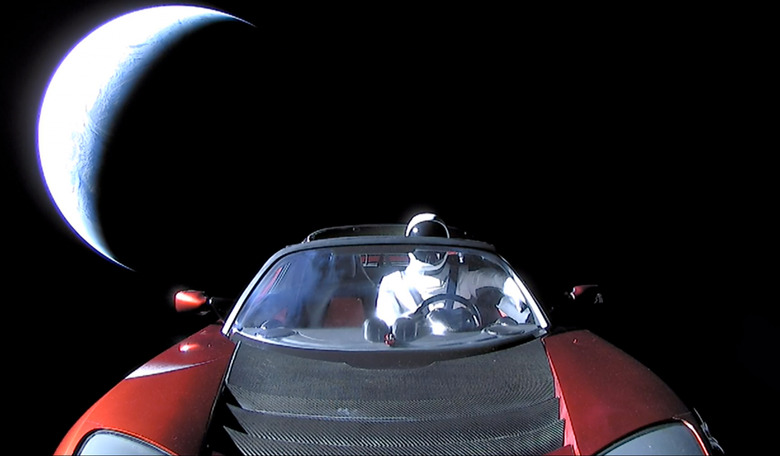Scientists Worry That Elon Musk's Flying Tesla Could Contaminate Mars With Bacteria From Earth
It's only been a couple of weeks since Elon Musk and SpaceX launched the Falcon Heavy into space, toting Musk's own bright red Tesla Roadster along for the ride. It was a momentous moment and a launch that topped virtually all expectations. Unfortunately, Musk's decision to send a car into an orbit around the Sun isn't sitting well with some scientists, and there's a real fear that the car and its Starman passenger could contaminate another world, namely Mars.
Researchers at Purdue University are weighing in on the possibility that the Tesla Roadster could eventually impact Mars, and bring a whole host of bacteria from Earth along with it. Nobody really knows where the Tesla will end up, and while its eventual demise will lead it to collide with either Earth, Mars, or potentially even the Sun itself, that won't happen for millions of years. Still, the potential of terrestrial bacteria to end up somewhere other than Earth is seriously troubling.
"If there is an indigenous Mars biota, it's at risk of being contaminated by terrestrial life," professor Jay Melosh of Purdue explains. "Would Earth's organisms be better adapted, take over Mars and contaminate it so we don't know what indigenous Mars was like, or would they be not as well adapted as the Martian organisms? We don't know."
We've seen what invasive species do here on Earth, and it's not pretty. Introducing non-native organisms to a new environment can often cause chaos, devastating the delicate environmental balance of any given area. We know Mars isn't bustling with life like Earth is, but we still don't know if microbial life exists somewhere on the surface, and introducing bacteria from Earth could spell disaster.
NASA has strict guidelines about what it sends (or helps send) into space. The company ensures that all hardware designed to land on a planet is completely sterile before being sent skyward, but spacecraft designed to orbit aren't given the same treatment. That's why the Cassini probe had to make a careful dive into Saturn's atmosphere in order to ensure it was completely incinerated before any possible bacteria could reach the planet's surface. Elon Musk's Tesla Roadster was most certainly not sterilized before launch, and that could spell trouble many years down the road.
It's easy to brush off the concerns due to the timeline, but it's important to remember that many bacteria we've discovered here on Earth have the ability to go dormant under certain conditions, including the frigid vacuum of space. There's no telling how long a microbial life form could hibernate for before waking back up in the distant future, and if the Roadster crash lands on Mars, those bacteria could wake back up.
Of course, all of this is assuming humanity doesn't actually colonize Mars ourselves. A million years in the future is a long time, and there's a good chance humanity has already pushed off of this Solar System by that point, if we don't destroy ourselves first.
